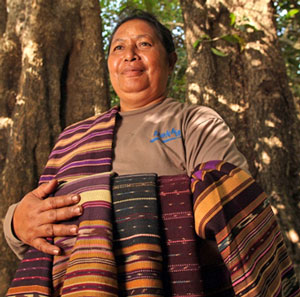Through capacity building and microfinance programs, Australia and the World Bank are helping achieve social and economic empowerment for female heads of households in Indonesia. Photo: Josh Estey, AusAID
Australia and the World Bank are working together to improve gender equality [video, external website] and to empower women in developing countries. Investments in women's and girls' education and health see some of the highest returns of all development investments, including reduced rates of maternal mortality, better educated and healthier children, and increased household incomes.
Gender equality extends beyond improving female health and education. It means better access for women to economic resources, participation and leadership in decision making, and respect for the human rights of women, including the right to a life free of violence.
Australia values the World Bank's strength in research and analysis when it comes to gender. Australia worked with the World Bank in the preparation and dissemination of the influential 2012 World Development Report Gender Equality and Development [external website], as well as a companion report, Toward Gender Equality in East Asia and the Pacific [external website]. Both reports argue for gender equality as an important development objective in its own right, which also makes good economic sense. Australia is supporting the integration of gender equality into World Bank-funded initiatives in Indonesia, Papua New Guinea, Laos, and across the Pacific.
Enhancing the lives of people with disabilities is also an aid policy priority for Australia. The World Bank is in a strong position to support developing countries to progress their policies within broader aid programming, particularly as many have ratified or will be ratifying the UN Convention on the Rights of Persons with Disabilities. In particular, the World Bank has assisted in the development of Australia's Universal Design Guidelines, which will ensure Australia-supported infrastructure is more accessible for people with disabilities. The World Bank will play a critical role in the implementation of these guidelines.
Australia helped the World Health Organization and the World Bank develop the inaugural World Report on Disability (2011) [external website]. This landmark resource draws on the best available evidence and makes specific recommendations for the necessary actions to improve the quality of life of people with disabilities and increase support for the Convention on the Rights of Persons with Disabilities.
Giving women a voice and a future
In Indonesia, households headed by women generally occupy a marginal position in all aspects of life and are denied opportunities. Widows account for a significant share of the rural very poor. The Female-Headed Household Empowerment Program, supported by both the World Bank and Australia, aims to change that by overcoming widows' isolation and supporting the development of self- reliant groups. Focusing on capacity building and microfinance is helping achieve social and economic empowerment.
Through groups formed under the project, women learn to read and write, bookkeeping, and other skills. After a year with the group, women gain access to community grants or loans to help develop a business, educate their children or to fund other projects of their choosing. The program also works with women to improve their ability to access justice through the formal legal system, including supporting women to obtain birth certificates for their children so they can be registered to attend school, training village-level paralegals and raising poor and marginalised women's legal awareness, as well as encouraging courts to waive fees for the poor and hold circuit courts in remote areas.
The wide-ranging program has built and renovated houses; provided scholarships to children; trained women leaders and paralegals; opened early childhood education centres, literacy centres and community-based learning centres; established community radio stations; and created microcredit schemes. The project has 750 groups in 475 villages that have benefited around 20,000 women and approximately 52,000 of their family members.

